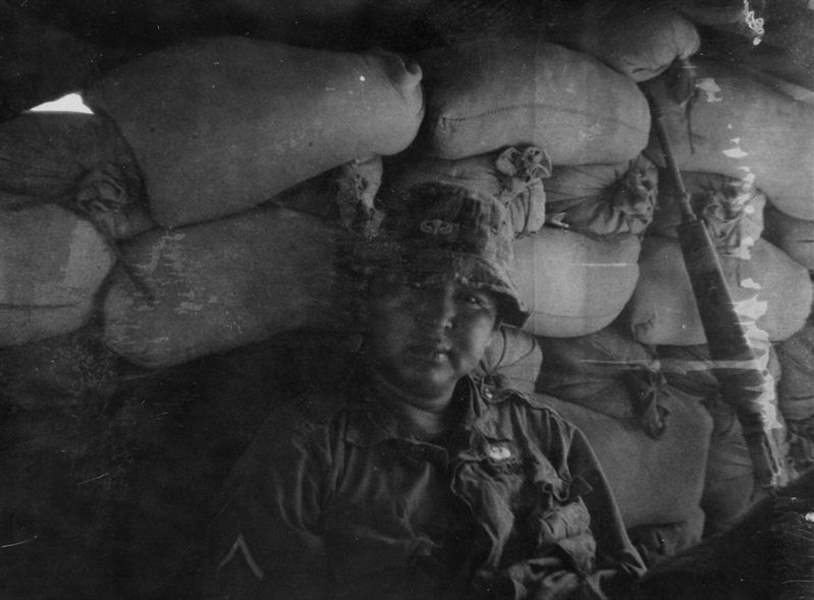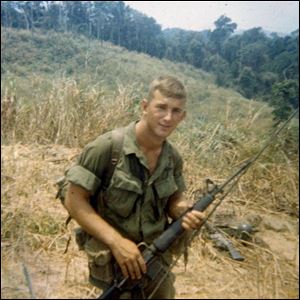
7 allegations focused on GI from Arizona
10/19/2003
Pvt. Sam Ybarra was often seen wearing a necklace of human ears and was known for scalping
Morrison / Blade photo
Sam Ybarra sat in the darkness of his mother's Arizona home, sobbing.
Once a feared member of Tiger Force who boasted of shooting civilians, he was now a broken figure - haunted by images of the war.
“I would ask him: `What's wrong? Why are you crying?'” recalled Therlene Ramos. “He would say: `It's my life. What I did. What I did. I killed people, mama. I killed regular people. I shouldn't have. My God, what did I do?'”
His hands shaking, he would curl up on her couch, repeating the question: `“Why?” she said.
But in the end, only he could answer.
The once stocky paratrooper was a notorious suspect in the longest war-crime investigation of the Vietnam War.
Three times, investigators tried to question him about the accusations against him; three times he refused. Since he was no longer in the military, he was not legally required to comply.
But before he died in 1982, he broke down to those closest to him, say friends and relatives.
His mother, now 78, recalls consoling him.
“He would be sitting and crying. Sitting and crying. He said to me, `I really feel bad. I asked God to forgive me for what I did for killing all those people, all those civilians, all those children. They never meant to do me any wrong.'”
Of the 30 war-crime allegations against Tiger Force investigated by the Army, Ybarra is named in seven, including the rape and fatal stabbing of a 13-year-old girl and the brutal killing of a 15-year-old boy.
Over and over, he was seen cutting off the ears of dead enemy soldiers and villagers, at times, scalping them with a hunting knife, soldiers told investigators.
Thirteen former platoon members said they were struck by the same image: Ybarra wearing necklaces of human ears.
Before he left Vietnam, he would be court-martialed and disciplined three times - removed from special forces.

Pvt. Sam Ybarra was often seen wearing a necklace of human ears and was known for scalping
By the time the investigation was under way in 1971, he was discharged and living on the San Carlos Apache Reservation in Arizona where he was raised. After years of alcohol and drugs, he died of pneumonia at 36.
Through dozens of military records and interviews, a troubling snapshot of the veteran emerges.
Born in a working-class family, he was the son of an Apache mother and Mexican father. When he was 5, his father was killed in a barroom brawl.
As he grew older, Sam Ybarra was described by relatives and friends as awkward and quiet - a chubby teenager with a short temper, especially when drinking.
He dropped out of Globe High School his junior year, and at one point, ran away from home, saying he wanted to be alone, relatives said.
By the time he was 18, he was arrested four times for underage drinking and disturbing the peace, records show.
When he wasn't getting into trouble, he was hunting and fishing on Lake Roosevelt, or cruising the dusty roads near Globe, Ariz., with his high school friend, Kenneth “Boots” Green.
In 1966, the two joined the Army on a dare, according to family members.
After arriving in Vietnam, Ybarra became a Tiger Force soldier and eventually talked his best friend into joining.
They would both gain reputations as soldiers who could be trusted in battle and cruel to villagers.

After the death of Kenneth 'Boots' Green, Sam Ybarra was never the same. Ybarra vowed to avenge his friend's death, relatives and former soldiers said.
Green was accused by a fellow platoon member of torturing a gagged prisoner near Duc Pho in May, 1967, by repeatedly jabbing a knife into his neck before killing him by slashing his throat, Army records show.
Ybarra was accused by another soldier near the same village of shooting an unarmed 15-year-old boy and then severing his ears to string onto a necklace.
Five former Tiger Force soldiers, including two sergeants, told investigators that Ybarra and Green bragged about raping and killing a teenage girl after a search- and-destroy mission near Tam Ky in August.
Though the platoon often operated in small teams, the two friends always seemed to be together, said witnesses.
During a military operation on Sept. 29, 1967, the platoon was ambushed, and Green was shot in the leg. As he was dragged away by a medic, he was shot in the head and died as his friend watched.
Ybarra would never be the same, say soldiers and relatives, promising to avenge Green's death.
For the next two months, he became one of the platoon's most prolific killers, according to sworn statements of other soldiers.
During a sweep of a village near Chu Lai, he carried out a gruesome atrocity that led to the Army's investigation of Tiger Force.
Two soldiers said he decapitated an infant to remove a necklace known as a “Buddha Band” from the baby's neck.
Several soldiers said Ybarra later bragged about killing the baby.
One Tiger Force sergeant told investigators most of the soldiers feared Ybarra. “He had no mercy for anyone,” James Barnett said in 1973. “This includes Vietnamese civilians, women, and children.”
Medic Harold Fischer said in a recent interview soldiers had to restrain Ybarra from attacking civilians. “He would kill unarmed villagers when the opportunity presented itself, which sometimes was on a daily basis.”
By 1968, Ybarra was no longer in the unit.
After several confrontations with superiors, he was sent to an artillery company. By 1969, he was court-martialed three times for insubordination and marijuana possession, records show.
He was once disciplined for refusing to go into a bunker during a rocket attack. Sgt. Buford McClure wrote in a report on March 13, 1969, that Ybarra stood defiantly in the barracks.
“He just laughed, and said, `Everyone is getting shook up like a scared rabbit. I told you I wanted to go back to the Airborne so I can kill me some of those gooks and somebody else.'”
An Army psychologist described him as “limited, inflexible, lacking in tact and with a low frustration tolerance.''
Dishonorably discharged from the Army in April, 1969, he returned to Arizona, where he moved to the reservation.
When investigators last tried to interview him in 1975, he was living in a trailer and suffering from diabetes and cirrhosis of the liver.
Intoxicated, he refused to meet with investigators at the reservation police station, reports state.
For years, he had been spending his days drinking alcohol and smoking marijuana, said Joyce Little, his former wife.
“He didn't work,” she said.
His mother offered a simple explanation: He was deeply disturbed by the years he spent in Vietnam.
Army records show Ybarra weighed 185 pounds when he served in Vietnam. When he died, he was 95 pounds, said family members.
His sister, Judith Ybarra, said her brother was a “sweet boy,” but when he returned from the war, “he was changed.”
She and other relatives said they did not know the details of his atrocities. They, along with friends and others on the reservation, remember him as a brave soldier.
On past Memorial Days, his name has been invoked at memorial services, and local newspapers have written about his battle exploits.
But in the end, he “drank to forget about what he did in Vietnam,” said his former wife.
“Maybe he was afraid of the demons, the ghosts of the people he killed, the things he did. He probably died haunted by those ghosts.”
(Story was published on Oct. 19, 2003)